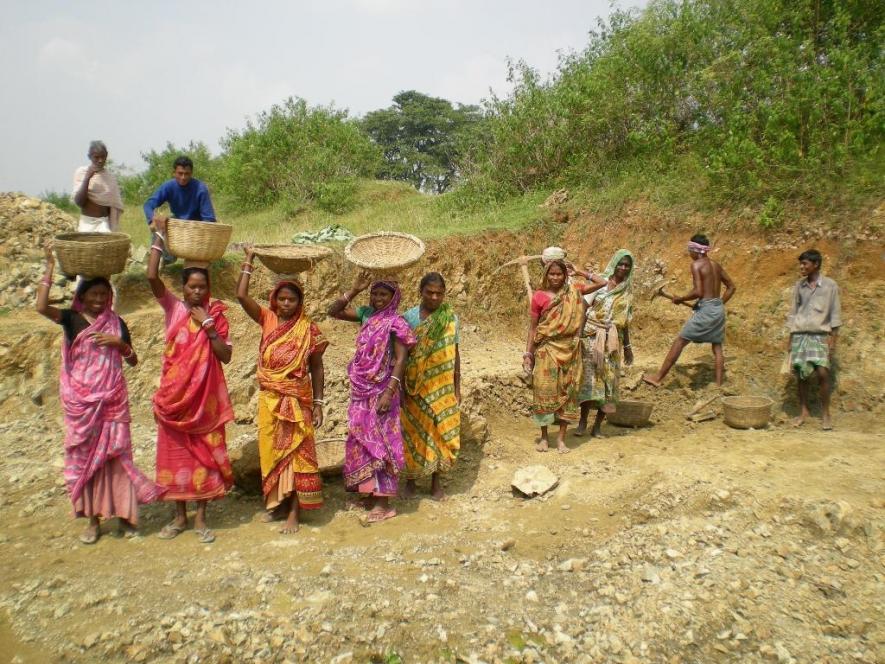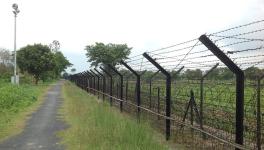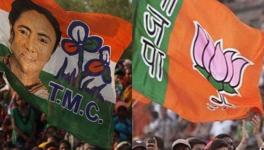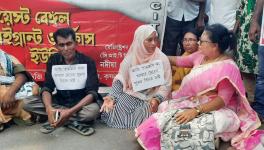Ailing NREGA: Additional Fund Allocation Uncertain, Activists to Protest Against Poor Implementation of Scheme

Kolkata: Uncertainty looms over the Centre's decision on additional fund allocation to the MGNREGA programme before undertaking the traditional mid-term review at the end of August or early September. Contrary to official expectations, the dependence of rural households on jobs under the Mahatma Gandhi National Rural Employment Guarantee Act (MGNREGA), 2005, might increase in the coming weeks.
The NREGA Sangharsh Morcha (NSM) has called for a protest from August 2 to 4 against insufficient fund allocation, delay in wage disbursal, and other issues in the implementation of the employment scheme.
The government expected the situation to improve from mid-July and demand for MGNREGA jobs to be easily manageable. Several factors emerging in recent weeks may dampen that expectation.
Out of India's 694 districts, rainfall deficits of varying extents have been recorded in 42% of the districts, and only 30% have experienced a normal deficit early this month. The adverse impact manifested in kharif paddy sowing during the early part of July's third week. The area under paddy farming went down by 17.38% to 128.5 lakh hectares, as against 155.5 lakh hectares in the same period last year, according to the Union agriculture ministry.
In the last week, the monsoon's progress and spatial distribution have not satisfied the authorities. Agriculturally crucial parts of Uttar Pradesh, Jharkhand, Chhattisgarh, Madhya Pradesh, West Bengal, Odisha, Gujarat, and Maharashtra are on the watch list of the ministry. As agriculture is affected by the rainfall deficit, the demand for NREGA jobs is expected to spike.
Insufficient Budget Allocation
In the Union ministry of rural development (MoRD)'s demand for grants for 2022-23, the allocation under MGNREGA is Rs 73,000 crore, the same as budget estimates (BE) for 2021-22. However, with subsequent provision for Rs 25,000 crore due to higher demand for work, the total allocation had risen to Rs 98,000 crore in 2021-22. Thus, the allocation for the current fiscal year is 25.51% lower than the revised estimates (RE) for 2021-22.
At the start of the current fiscal, pending liabilities stood at Rs 18,350 crore, according to NSM leader Debmalya Nandy. Thus, the dues leave only Rs 54,650 crore for spending during 2022-23. By the early part of July's third week, the amount spent was already close to Rs 33,970 crore.
Moreover, as per the information given by the treasury bench in Rajya Sabha in reply to Starred Question no. 34 dated July 20, the pending liabilities for the wage component as of July 19 worked out to be Rs 3,990 crore. Within this, the lion's share – Rs 2,606 crore – is of West Bengal, which is suffering from political tension between the Centre and the state. Bihar comes next at Rs 558 crore, and the chill in Chief Minister Nitish Kumar's relation with its ally Bharatiya Janata Party "may explain the uncleared dues of Bihar", say political observers.
Protest Brews Against Dues, Delays
Against this backdrop, NSM activists from different parts of the county have decided to organise protests in New Delhi between August 2 and 4 to highlight the Centre's apparent disinterest in implementing the demand-driven, misery-mitigating and livelihood sustenance scheme for the countryside. An MGNREGA allocation much less than what is genuinely needed presents a great uncertainty for job card holders. Besides, there is an invariable delay in the disbursal of funds on the Centre's part. Compensatory payments on the stipulated basis, when states fail to provide jobs on demand within a fortnight, are also frequently delayed.
Under MNREGA provisions, after work is completed, states have one week to generate a Fund Transfer Order (FTO) and digitally forward the same to MoRD, which also gets one week to process FTOs and transfer wages directly to the workers' accounts.
Thus, two stages are involved in wage disbursal, and because of local pressure, states try to do their bit in one week. However, the MoRD often takes two weeks to process the FTOs and disburse wages.
Nonetheless, it's not all flawless at the state government level. Malpractices, misappropriations and neglect of prescribed social audit, which is intended to be a community exercise, continue to mar the implementation of the scheme. This gives an excuse to the Centre to hold back funds.
The Union finance ministry also wields the stick, at times in a weird manner. For example, its caste-based wage payment provisions from 2021-22 stipulated one FTOs each for SCs, STs and others (general category and OBCs). States resented the arrangement because of "rising social tensions" and the Parliament's Standing Committee for Rural Development firmly demanded its roll-back. Following this, North Block, on November 1 last year, asked MoRD to "revert to the previous system of generating singly muster, single FTO and transferring money into a singly National Electronic Fund Management System account".
Even so, North Block prescribed a new procedure for "capturing expenditure under three minor heads – SCs, STs and others – through a single FTO". Thus, the caste approach remains in the procedure in a diluted form.
The NSM protest meetings would highlight the above-mentioned issues and demand the Centre and the states to sincerely implement the rural job scheme, NSM coordinator Ms Apoorva Gupta told NewsClick.
Nandy said, "The BE of Rs 73,000 crore, considering pending liabilities at the start of this fiscal and fresh wage dues that have occurred, will prove grossly inadequate to fulfil the needs of approximately 16 crore NREGA job card holding families".
Apart from delays in payments and slowdown of work post-monsoon, it seems the Union government gives little credence to labour budgets sent by states that take into account the decentralised planning exercises of gram sabhas. New Delhi invariably opts for arbitrary allocations, Nandy claimed.
Centre Vs West Bengal
Ms Anuradha Talwar, activist with Paschim Banga Khet Majoor Samity (PBKMS) and NSM, told NewsClick that workers in the state have not received payments since last December and the Centre still has not released funds to the West Bengal government.
A protest rally was organised by PBKMS on June 24 in the Purulia district against the prevailing state of affairs and to highlight how workers are suffering. A standing grievance of the Centre against the West Bengal government is that it does not make honest efforts to curb corruption and eliminate nepotism in issuing job cards. Also, the state government does not conduct social audits involving all stakeholders on the quality of work, disbursements, labourers employed and materials used.
For this purpose, social audit units (SAUs) have to be constituted, the cost of which is borne by the Centre. The cost of conducting social audit is treated as part of the administrative expenditure. It is for state governments to follow the findings of SAUs.
Chief Minister Mamata Banerjee has frequently been accusing the Centre of targeting West Bengal by withholding MGNREGA fund releases.
About two weeks back, Banerjee threatened to take a truckload of people to New Delhi to register a protest against New Delhi's "irrational stance". However, things suddenly changed as she found herself in a tight spot after the arrest of senior Trinamool Congress leader and state industry minister Partha Chattopadhyay by the Enforcement Directorate on July 23. He was arrested in connection with the school jobs scam during his term as state education minister.
The minister's arrest followed hours of interrogation and recovery of Rs 21 crore and jewellery of high value from the residence of Arpita Mukherjee, who officers have described as an aide of the minister. She was arrested shortly after the minister.
While this 'drama' continues to unfold and an apparently disturbed chief minister is trying her best to distance herself from her industry minister, the MoRD has done its bit by ordering teams of officials to carry out on-the-spot study of projects executed, under execution and allied subjects. Significantly, the officials will choose the places they will visit and not go by the programme drawn up by district magistrates (DMs). In this regard, the state government has instructed DMs to "cooperate fully" with the Union government officials.
Get the latest reports & analysis with people's perspective on Protests, movements & deep analytical videos, discussions of the current affairs in your Telegram app. Subscribe to NewsClick's Telegram channel & get Real-Time updates on stories, as they get published on our website.
























